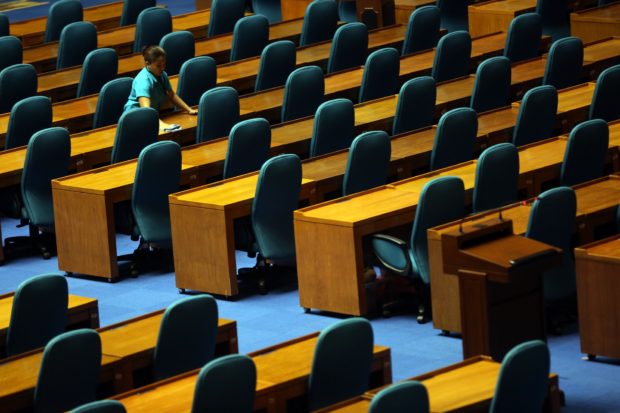House panel OKs consolidation of bills creating forensic database

The plenary hall of the House of Representatives in Batasan, Quezon City. INQUIRER FILE PHOTO / NINO JESUS ORBETA
MANILA, Philippines — A House of Representatives panel has moved to consolidate bills proposing the creation of a forensic database for DNA (Deoxyribonucleic acid) to aid law enforcement efforts, but an expert has raised concerns about the database’s potential impact on individual rights and privacy.
During the hearing of the House committee on public order and safety on Tuesday, Dr. Maria Corazon De Ungria, who heads the University of the Philippines (UP) DNA Analysis Laboratory, said they are supportive of House Bills No. 94 and 540, both of which propose the establishment of a DNA forensic database for the government.
De Ungria, however, suggested that the technical working group assigned to consolidate the bills and amend sections include those from the human rights community, as genome sequencing can expose people who may be related to perpetrators of criminal activities but are not involved in the crime.
“We’re doing now whole genome sequencing, which includes finding forensic investigative leads using DNA, and therefore we want to share this with PNP (Philippine National Police) and NBI (National Bureau of Investigation), however, in a manner that does not cause a lot of harm and protects the privacy of individuals,” she told the House panel.
“I agree, there should be law enforcement there, but we need to balance that with the human rights perspective. Why? Because law enforcement is to secure the community, the human rights community needs to make sure that the rest that are not causing danger would also be protected, so we need to balance that,” she added.
De Ungria further explained that because DNA comes from a person’s parents and is most likely to share parts of it with siblings, authorities can peek into a person’s familial history using his or her DNA.
However, she said this is becoming an ethical issue in Europe and the United States (US), because it allows the state to monitor and surveillance of people who may not be involved in a particular crime but partially matches the DNA sample obtained from a crime scene.
While this move may help law enforcement agencies track down perpetrators, De Ungria said this also exposes possibly innocent individuals to government monitoring, which she claimed might lead to “unwarranted search and seizure” in the future.
“For example: we obtained blood samples from the crime scene and searched the offender database, but nothing matched 100 percent. But from those inside the database, there are matches that are not 100 percent — 80 percent, 75 percent. What the FBI [Federal Bureau of Investigation] in the US is doing now is to take samples for the 75 and 80 percent matches, and they look for the relatives,” she explained.
“The presumption is those people share a lot of DNA with the crime scene sample, and therefore the perpetrator would likely be someone related to them Which is powerful, okay, that increases our law enforcement [capabilities] and our investigative leads. However, on the human rights side, that means that there are people who have not been convicted, that there is no probable evidence to actually start the investigation, but they are being monitored,” she added.
After raising her concerns, De Ungria was assured by the House committee chairperson and Sta. Rosa City Rep. Dan Fernandez that she would be part of the technical working group.
House Bill No. 94 and 540 were authored by Surigao del Norte 2nd District Rep. Robert Ace Barbers and Fernandez, respectively. Both seek to establish a forensic database system to quickly identify perpetrators of a crime through samples found on a crime scene.
Under both proposals, the government would create several indices of DNA samples collected from crime scenes, suspected persons, convicted and detained persons, drug dependents, missing persons or those found deceased, uniformed personnel, government employees, and volunteer samples or those given willingly by private individuals.
The DNA samples would be managed by a Philippine DNA Database Office under Barbers’ version, while Fernandez’ bill tasks the PNP Crime Laboratory to handle the samples.
Both bills also include assurances that the identity of the DNA samples would be kept confidential.
In the past, lawmakers have proposed building a DNA database to help solve crimes. Last July 2020, Senator Ronald dela Rosa — a former PNP chief during the time of former president Rodrigo Duterte — filed Senate Bill No. 1577 to help identify and prosecute criminals.
READ: Dela Rosa wants to establish DNA database to help solve crimes
As of now, DNA samples are being used to aid the prosecution of perpetrators, but no singular agency has been tasked to take care of these samples — despite their importance in solving crime cases.
RELATED STORIES:
DNA test confirms mutilated body that of retired CA justice
NBI: DNA of skeletal remains matches result of rape-slay victim’s test in Palawan